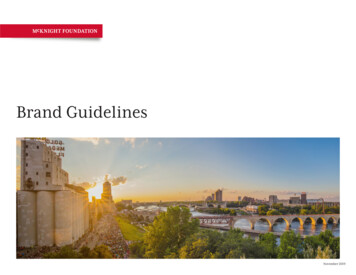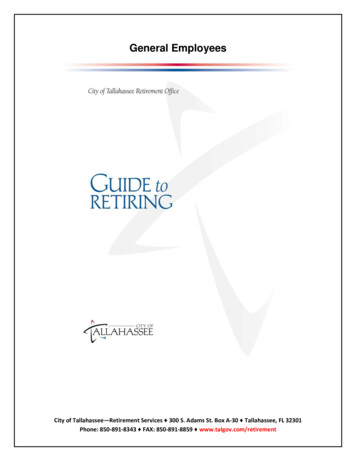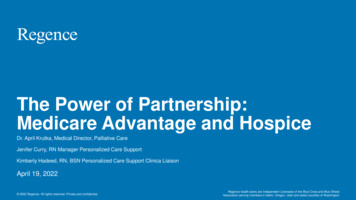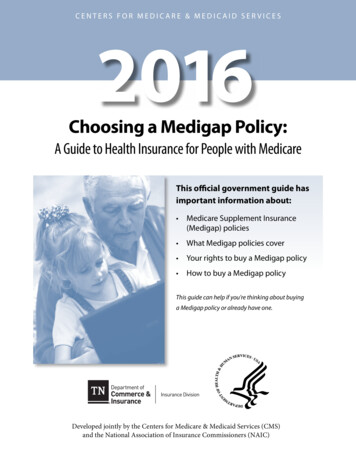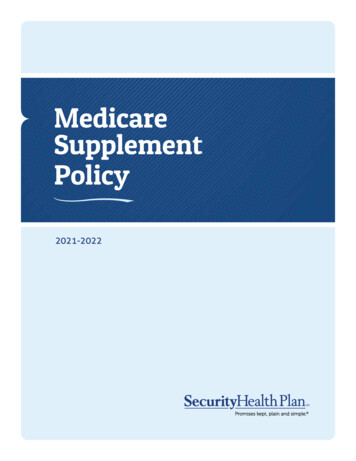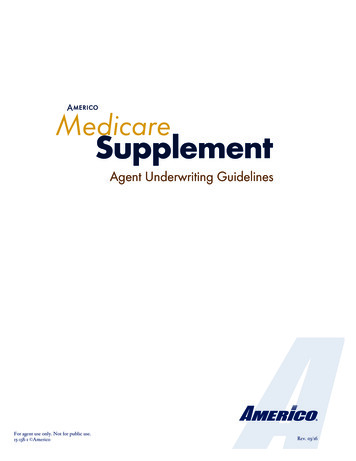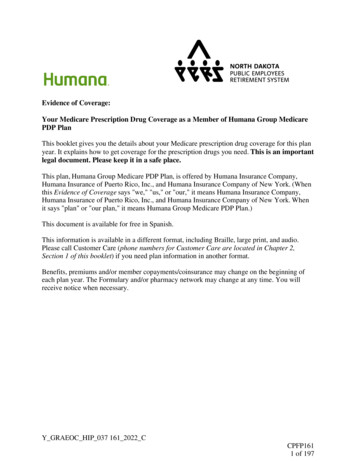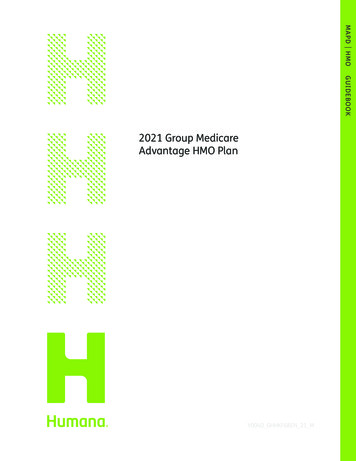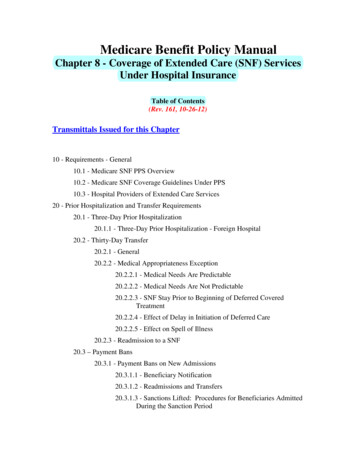
Transcription
Medicare Benefit Policy ManualChapter 8 - Coverage of Extended Care (SNF) ServicesUnder Hospital InsuranceTable of Contents(Rev. 161, 10-26-12)Transmittals Issued for this Chapter10 - Requirements - General10.1 - Medicare SNF PPS Overview10.2 - Medicare SNF Coverage Guidelines Under PPS10.3 - Hospital Providers of Extended Care Services20 - Prior Hospitalization and Transfer Requirements20.1 - Three-Day Prior Hospitalization20.1.1 - Three-Day Prior Hospitalization - Foreign Hospital20.2 - Thirty-Day Transfer20.2.1 - General20.2.2 - Medical Appropriateness Exception20.2.2.1 - Medical Needs Are Predictable20.2.2.2 - Medical Needs Are Not Predictable20.2.2.3 - SNF Stay Prior to Beginning of Deferred CoveredTreatment20.2.2.4 - Effect of Delay in Initiation of Deferred Care20.2.2.5 - Effect on Spell of Illness20.2.3 - Readmission to a SNF20.3 – Payment Bans20.3.1 - Payment Bans on New Admissions20.3.1.1 - Beneficiary Notification20.3.1.2 - Readmissions and Transfers20.3.1.3 - Sanctions Lifted: Procedures for Beneficiaries AdmittedDuring the Sanction Period
20.3.1.4 - Payment Under Part B During a Payment Ban on NewAdmissions20.3.1.5 - Impact of Consolidated Billing Requirements20.3.1.6 - Impact on Spell of Illness30 - Skilled Nursing Facility Level of Care - General30.1 – Administrative Level of Care Presumption30.2 - Skilled Nursing and Skilled Rehabilitation Services30.2.1 - Skilled Services Defined30.2.2 - Principles for Determining Whether a Service is Skilled30.2.3 - Specific Examples of Some Skilled Nursing or SkilledRehabilitation Services30.2.3.1 - Management and Evaluation of a Patient Care Plan30.2.3.2 - Observation and Assessment of Patient’s Condition30.2.3.3 - Teaching and Training Activities30.2.4 - Questionable Situations30.3 - Direct Skilled Nursing Services to Patients30.4. - Direct Skilled Rehabilitation Services to Patients30.4.1 – Skilled Physical Therapy30.4.1.1 - General30.4.1.2 - Application of Guidelines30.4.2 - Speech-Language Pathology30.4.3 - Occupational Therapy30.5 - Nonskilled Supportive or Personal Care Services30.6 - Daily Skilled Services Defined30.7 - Services Provided on an Inpatient Basis as a “Practical Matter”30.7.1 - The Availability of Alternative Facilities or Services30.7.2 - Whether Available Alternatives Are More Economical in theIndividual Case30.7.3 - Whether the Patient’s Physical Condition Would PermitUtilization of an Available, More Economical Care Alternative40 - Physician Certification and Recertification for Extended Care Services40.1 - Who May Sign the Certification or Recertification for Extended CareServices50 - Covered Extended Care Services
50.1 - Nursing Care Provided by or Under the Supervision of a RegisteredProfessional Nurse50.2 - Bed and Board in Semi-Private Accommodations Furnished in ConnectionWith Nursing Care50.3 - Physical, Therapy, Speech-Language Pathology and Occupational TherapyFurnished by the Skilled Nursing Facility or by Others UnderArrangements With the Facility and Under Its Supervision50.4 - Medical Social Services to Meet the Patient’s Medically Related SocialNeeds50.5 - Drugs and Biologicals50.6 - Supplies, Appliances, and Equipment50.7 - Medical Service of an Intern or Resident-in-Training50.8 - Other Services50.8.1 - General50.8.2 - Respiratory Therapy60 - Covered Extended Care Days70 - Medical and Other Health Services Furnished to SNF Patients70.1 - Diagnostic Services and Radiological Therapy70.2 - Ambulance Service70.3 - Inpatient Physical Therapy, Occupational Therapy, and Speech-LanguagePathology Services70.4 - Services Furnished Under Arrangements With Providers
Medicare Benefit Policy ManualChapter 810 - Requirements - General(Rev. 57, Issued: 11-08-06, Effective: 07-27-66, Implementation: 12-14-06)The term “extended care services” means the following items and services furnished toan inpatient of a skilled nursing facility (SNF) either directly or under arrangements asnoted in the list below: Nursing care provided by or under the supervision of a registered professionalnurse; Bed and board in connection with furnishing of such nursing care; Physical or occupational therapy and/or speech-language pathology servicesfurnished by the skilled nursing facility or by others under arrangements withthem made by the facility; Medical social services; Such drugs, biologicals, supplies, appliances, and equipment, furnished for use inthe skilled nursing facility, as are ordinarily furnished by such facility for the careand treatment of inpatients; Medical services provided by an intern or resident-in-training of a hospital withwhich the facility has in effect a transfer agreement (see §50.7) under an approvedteaching program of the hospital, and other diagnostic or therapeutic servicesprovided by a hospital with which the facility has such an agreement in effect, and Other services necessary to the health of the patients as are generally provided byskilled nursing facilities, or by others under arrangements.Post-hospital extended care services furnished to inpatients of a SNF or a swing bedhospital are covered under the hospital insurance program. The beneficiary must havebeen an inpatient of a hospital for a medically necessary stay of at least 3 consecutivecalendar days. Time spent in observation status or in the emergency room prior to (or inlieu of) an inpatient admission to the hospital does not count toward the 3-day qualifyinginpatient hospital stay, as a person who appears at a hospital’s emergency room seekingexamination or treatment or is placed on observation has not been admitted to the hospitalas an inpatient; instead, the person receives outpatient services. For purposes of the SNFbenefit’s qualifying hospital stay requirement, inpatient status commences with thecalendar day of hospital admission. See 31 Fed. Reg. 10116, 10118-19 (July 27, 1966).The beneficiary must also have been transferred to a participating SNF within 30 daysafter discharge from the hospital, unless the exception in §20.2.2 applies. In addition, thebeneficiary must require SNF care for a condition that was treated during the qualifyinghospital stay, or for a condition that arose while in the SNF for treatment of a conditionfor which the beneficiary was previously treated in the hospital.1 of 45
Medicare Benefit Policy ManualChapter 8Extended care services include SNF care for beneficiaries involuntarily disenrolling fromMedicare Advantage plans as a result of a Medicare Advantage plan termination whenthey do not have a 3-day hospital stay before SNF admission, if admitted to the SNFbefore the effective date of disenrollment.10.1 - Medicare SNF PPS Overview(Rev. 57, Issued: 11-08-06, Effective: 07-27-66, Implementation: 12-14-06)Section 1888(e) of the Social Security Act provides the basis for the establishment of theper diem Federal payment rates applied under the PPS to SNFs that received their firstpayment from Medicare on or after October 1, 1995. A transition period applied forthose SNFs that first accepted payment under the Medicare program prior to October 1,1995. The BBA sets forth the formula for establishing the rates as well as the data onwhich they are based. See Chapter 28, Section 2836, of the Provider ReimbursementManual, Part I, (Pub. 15-1) for a comprehensive discussion of the SNF PPS.10.2 - Medicare SNF Coverage Guidelines Under PPS(Rev. 1, 10-01-03)PM - A-98-16 dated 5/98Under SNF PPS, covered SNF services include post-hospital SNF services for whichbenefits are provided under Part A (the hospital insurance program) and all items andservices which, prior to July 1, 1998, had been paid under Part B (the supplementarymedical insurance program) but furnished to SNF residents during a Part A covered stayother than the following: Physician services, physician assistant services, nurse practitioner and clinicalnurse specialist services, certified mid-wife services, qualified psychologistservices, certified registered nurse anesthetist services, certain dialysis-relatedservices, erythropoietin (EPO) for certain dialysis patients, hospice care related toa terminal condition, ambulance trips that convey a beneficiary to the SNF foradmission or from the SNF following discharge, ambulance transportation relatedto dialysis services, certain services involving chemotherapy and itsadministration, radioisotope services, certain customized prosthetic devices and,for services furnished during 1998 only, and the transportation costs ofelectrocardiogram equipment for electrocardiogram test services.Certain additional outpatient hospital services (along with ambulance transportation thatconvey a beneficiary to a hospital or CAH to receive the additional services) are excludedfrom coverage under SNF PPS and are billed separately. The additional services are: Cardiac catheterization services; Computerized axial tomography (CT scans);2 of 45
Medicare Benefit Policy Manual Magnetic resonance imaging (MRIs); Radiation therapy; Ambulatory surgery involving the use of a hospital operating room; Emergency services; Angiography services; and Lymphatic and venous procedures.Chapter 8The CMS identifies the above services using HCPCS codes that are periodically updated.The CMS publishes the HCPCS coding changes in each year in a clearly designatedProgram Memorandum (PM). This PM is referred to as an annual update. Other updatesfor the remaining quarters of the FY will occur as needed due to the creation of newtemporary codes representing services included in SNF PPS prior to the next annualupdate.10.3 - Hospital Providers of Extended Care Services(Rev. 58, Issued: 11-09-06, Effective: N/A, Implementation: 12-11-06)In order to address the shortage of rural SNF beds for Medicare patients, rural hospitalswith fewer than 100 beds may be reimbursed under Medicare for furnishing post-hospitalextended care services to Medicare beneficiaries. Such a hospital, known as a swing bedfacility, can “swing” its beds between the hospital and SNF levels of care, on an asneeded basis, if it has obtained a swing bed approval from the Department of Health andHuman Services. See Chapter 1, “General Overview,” in the Medicare GeneralInformation, Eligibility, and Entitlement Manual for a description of general rulesapplicable to SNFs and hospital swing beds.When a hospital is providing extended care services, it will be treated as a SNF forpurposes of applying coverage rules. This means that services provided in the swing bedare subject to the same Part A coverage, deductible, coinsurance and physiciancertification/recertification provisions that are applicable to SNF extended care services.The SNF coverage provisions are set forth in 42 CFR 409 Subpart D and are more fullyexplained in this chapter. A patient in a swing bed cannot simultaneously receivecoverage for both SNF-level services under Part A and inpatient hospital ancillaryservices under Part B.Swing bed patients who no longer qualify for Part A coverage of SNF-level servicesunder the Medicare program (due to exhaustion of Part A SNF benefits, dropping below aSNF level of care, etc.) revert to receipt of a hospital level of care in the swing bed (seethe Medicare Benefit Policy Manual, Chapter 6, “Hospital Services Covered Under PartB,” §10). Thus, any further Medicare coverage in the swing bed would be for inpatient3 of 45
Medicare Benefit Policy ManualChapter 8hospital ancillary services under Part B, notwithstanding a patient’s eligibility forMedicaid NF coverage.A dually-eligible patient who continues to receive a SNF level of care or who hasdropped below the SNF level may nonetheless still qualify for Medicaid coverage ofnursing facility (NF) services, if the hospital has a Medicaid swing bed agreement thathas been approved by the State in which the facility is located. Such agreements permitMedicaid-participating rural hospitals to use their beds interchangeably to furnish bothacute hospital care and NF care to Medicaid recipients, when no beds are available inarea nursing facilities.20 - Prior Hospitalization and Transfer Requirements(Rev. 1, 10-01-03)A3-3131, SNF-212In order to qualify for post-hospital extended care services, the individual must have beenan inpatient of a hospital for a medically necessary stay of at least three consecutivecalendar days. In addition, effective December 5, 1980, the individual must have beentransferred to a participating SNF within 30 days after discharge from the hospital, unlessthe exception in §20.2 applies.4 of 45
MedicareBenefitMedicare BenefitPolicyPolicyManual ManualChapterChapter8820.1 - Three-Day Prior Hospitalization(Rev. 161, Issued: 10-26-12, Effective: 04-01-13, Implementation: 04-01-13)The hospital discharge must have occurred on or after the first day of the month in which the individualattained age 65 or, effective July 1, 1973, became entitled to health insurance benefits under the disability orchronic renal disease provisions of the law. The 3 consecutive calendar day stay requirement can be met bystays totaling 3 consecutive days in one or more hospitals. In determining whether the requirement has beenmet, the day of admission, but not the day of discharge, is counted as a hospital inpatient day.Time spent in observation status or in the emergency room prior to (or in lieu of) an inpatient admission tothe hospital does not count toward the 3-day qualifying inpatient hospital stay, as a person who appears at ahospital’s emergency room seeking examination or treatment or is placed on observation has not beenadmitted to the hospital as an inpatient; instead, the person receives outpatient services. For purposes of theSNF benefit’s qualifying hospital stay requirement, inpatient status commences with the calendar day ofhospital admission. See 31 Fed. Reg. 10116, 10118-19 (July 27, 1966).To be covered, the extended care services must have been for the treatment of a condition for which thebeneficiary was receiving inpatient hospital services (including services of an emergency hospital) or acondition which arose while in the SNF for treatment of a condition for which the beneficiary waspreviously hospitalized. In this context, the applicable hospital condition need not have been the principaldiagnosis that actually precipitated the beneficiary’s admission to the hospital, but could be any one of theconditions present during the qualifying hospital stay.In addition, the qualifying hospital stay must have been medically necessary. Medical necessity willgenerally be presumed to exist. When the facts that come to the intermediary’s attention during the courseof its normal claims review process indicate that the hospitalization may not have been medically necessary,it will fully develop the case, checking with the attending physician and the hospital, as appropriate. Theintermediary will rule the stay unnecessary only when hospitalization for 3 days represents a substantialdeparture from normal medical practice. However, in accordance with Pub. 100-04, Medicare ClaimsProcessing Manual, chapter 30, section 130.2.A, when a beneficiary qualifies for limitation of liability inconnection with the hospital stay, this conclusively establishes that the hospital stay was not medicallynecessary.Even if a beneficiary’s care during a qualifying hospital stay becomes less intensive during the latter part ofthe stay, the date of hospital “discharge” in this context is still considered to be the day that the beneficiaryphysically leaves the hospital, and the level of care being furnished at that particular point is not adetermining factor as long as some portion of the stay included at least 3 consecutive days of medicallynecessary inpatient hospital services. In addition, when a hospital inpatient’s care needs drop from acuteto SNF-level but no SNF bed is available, the regulations at 42 CFR 424.13(b) permit a physician to certifythat the beneficiary’s continued inpatient stay in the hospital is, in fact, medically necessary under thisparticular set of circumstances. Accordingly, such additional, “alternate placement” days spent in thehospital can be included in the 3-day count toward meeting the SNF benefit’s qualifying hospital stayrequirement.The 3-day hospital stay need not be in a hospital with which the SNF has a transfer agreement. However,the hospital must be either a Medicare-participating hospital or an institution that meets at least theconditions of participation for an emergency services hospital (see Pub. 100-01, Medicare General5 of 45
Medicare Benefit Policy ManualChapter 8Information, Eligibility, and Entitlement Manual, Chapter 5, §20.2, for the definition of an emergencyservices hospital). A nonparticipating psychiatric hospital need not meet the special requirements applicableto psychiatric hospitals. Stays in Religious Nonmedical Health Care Institutions (See Pub. 100-01,Medicare General Information, Eligibility, and Entitlement Manual, Chapter 5, §40, for definition ofRNHCIs) are excluded for the purpose of satisfying the 3-day period of hospitalization. See chapter 9,section 40.1.5 of the Medicare Benefit Policy Manual, regarding a qualifying stay that consists of “generalinpatient care” under the hospice benefit.NOTE: While a 3-day stay in a psychiatric hospital satisfies the prior hospital stay requirement, institutionsthat primarily provide psychiatric treatment cannot participate in the program as SNFs. Therefore, a patientwith only a psychiatric condition who is transferred from a psychiatric hospital to a participating SNF islikely to receive only non-covered care. In the SNF setting, the term “non-covered care” refers to any levelof care less intensive than the SNF level of care that is covered under the program. (See §§30ff.).20.1.1 - Three-Day Prior Hospitalization - Foreign Hospital(Rev. 1, 10-01-03)A3-3131.2, SNF-212.2A stay of three or more days in a hospital outside the United States may satisfy the priorinpatient stay requirement for post-hospital extended care services within the UnitedStates if the foreign hospital is qualified as an “emergency hospital” (see Chapter 3,§§110 of the Medicare Claims Processing Manual for a description of foreign andemergency services payable by Medicare. Also see Chapter 5, §20.2). If a stay of threeor more days in a hospital outside the United States is being considered to satisfy theprior inpatient stay requirement, the SNF will submit documentation to the intermediary.This evidence will be either:A. An itemized bill or hospital form prepared by the foreign hospital showing datesof admission and discharge and a description of the illness or injury treated(obtained from the beneficiary); orB. A medical report prepared by the foreign hospital and sent to the patient’s U.S.physician showing dates of admission and discharge and a description of theillness or injury treated (obtained from the physician).If neither type of evidence can be obtained, the SNF will secure whatever information isavailable for submission to the FI. When the intermediary receives a bill involving aprior inpatient stay in a foreign hospital, it contacts the regional office for a determinationas to whether the prior stay requirement is met. If the regional office states the hospitaldoes not qualify as an “emergency hospital,” the intermediary advises the provider thatthe prior inpatient stay requirement is not met.If the regional office states the hospital qualifies as an “emergency hospital” anddocumentation is submitted as outlined in either §§20.2.1 or 20.2.2 which otherwisemeets the prior-stay requirement, the intermediary processes the SNF claim.6 of 45
Medicare Benefit Policy ManualChapter 820.2 - Thirty-Day Transfer(Rev. 1, 10-01-03)A3-3131.3, SNF-212.320.2.1 - General(Rev. 161, Issued: 10-26-12, Effective: 04-01-13, Implementation: 04-01-13)A3-3131.3.A, SNF-212.3.APost-hospital extended care services represent an extension of care for a condition for which the individualreceived inpatient hospital services. Extended care services are “post-hospital” if initiated within 30 daysafter discharge from a hospital stay that included at least three consecutive days of medically necessaryinpatient hospital services. In certain circumstances the 30-day period may be extended, as described in§20.2.2 below. Even if a beneficiary’s care during a qualifying hospital stay becomes less intensive duringthe latter part of the stay, the date of hospital “discharge” in this context is still considered to be the daythat the beneficiary physically leaves the hospital, and the level of care being furnished at that particularpoint is not a determining factor as long as some portion of the stay included at least 3 consecutive days ofmedically necessary inpatient hospital services.In determining the 30-day transfer period, the day of discharge from the hospital is not counted in the 30days. For example, a patient discharged from a hospital on August 1 and admitted to a SNF on August 31was admitted within 30 days. The 30-day period begins on the day following actual discharge from thehospital and continues until the individual is admitted to a participating SNF, and requires and receives acovered level of care. Thus, an individual who is admitted to a SNF within 30 days after discharge from ahospital, but does not require a covered level of care until more than 30 days after such discharge, does notmeet the 30-day requirement. (See §20.2.2 below for an exception under which such services may becovered.) Conversely, as long as a covered level of care is needed and initiated in the SNF within thespecified timeframe, the timely transfer requirement is considered to be met even if actual Medicarepayment does not commence until later (for example, in a situation where another payment source that isprimary to Medicare has assumed financial responsibility for the initial portion of the SNF stay).If an individual whose SNF stay was covered upon admission is thereafter determined not to require acovered level of care for a period of more than 30 days, payment could not be resumed for any extendedcare services he or she may subsequently require, even though he or she has remained in the facility, untilthe occurrence of a new qualifying hospital stay. In the absence of a new qualifying hospital stay, suchservices could not be deemed to be “post-hospital” extended care services. (For exception, see §20.2.2below.)7 of 45
Medicare Benefit Policy ManualChapter 820.2.2 - Medical Appropriateness Exception(Rev. 1, 10-01-03)A3-3131.3.B, SNF-212.3.BAn elapsed period of more than 30 days is permitted for SNF admissions where thepatient’s condition makes it medically inappropriate to begin an active course oftreatment in a SNF immediately after hospital discharge, and it is medically predictable atthe time of the hospital discharge that he or she will require covered care within apredeterminable time period. The fact that a patient enters a SNF immediately upondischarge from a hospital, for either covered or noncovered care, does not necessarilynegate coverage at a later date, assuming the subsequent covered care was medicallypredictable.20.2.2.1 - Medical Needs Are Predictable(Rev. 1, 10-01-03)A3-3131.3.B.1, SNF-212.3.B.1In determining the type of case that this exception is designed to address, it is necessaryto recognize the intent of the extended care benefit. The extended care benefit coversrelatively short-term care when a patient requires skilled nursing or skilled rehabilitationservices as a continuation of treatment begun in the hospital. The requirement thatcovered extended care services be provided in a SNF within 30 days after hospitaldischarge is one of the means of assuring that the SNF care is related to the prior hospitalcare.This exception to the 30-day requirement recognizes that for certain conditions, SNF carecan serve as a necessary and proper continuation of treatment initiated during the hospitalstay, although it would be inappropriate from a medical standpoint to begin suchtreatment within 30 days after hospital discharge. Since the exception is intended toapply only where the SNF care constitutes a continuation of care provided in the hospital,it is applicable only where, under accepted medical practice, the established pattern oftreatment for a particular condition indicates that a covered level of SNF care will berequired within a predeterminable time frame. Accordingly, to qualify for this exceptionit must be medically predictable at the time of hospital discharge that a covered level ofSNF care will be required within a predictable period of time for the treatment of acondition for which hospital care was received and the patient must begin receiving suchcare within that time frame.An example of the type of care for which this provision was designed is care for a personwith a hip fracture. Under the established pattern of treatment of hip fractures it is knownthat skilled therapy services will be required subsequent to hospital care, and that theycan normally begin within four to six weeks after hospital discharge, when weightbearing can be tolerated. Under the exception to the 30-day rule, the admission of apatient with a hip fracture to a SNF within 4 to 6 weeks after hospital discharge for8 of 45
Medicare Benefit Policy ManualChapter 8skilled care, which as a practical matter can only be provided on an inpatient basis by aSNF, would be considered a timely admission.20.2.2.2 - Medical Needs Are Not Predictable(Rev. 1, 10-01-03)A3-3131.3.B.2, SNF-212.3.B.2When a patient’s medical needs and the course of treatment are not predictable at thetime of hospital discharge because the exact pattern of care required and the time framein which it will be required is dependent on the developing nature of the patient’scondition, an admission to a SNF more than 30 days after discharge from the hospital isnot justified under this exception to the 30-day rule. For example, in some situations theprognosis for a patient diagnosed as having cancer is such that it can reasonably beexpected that additional care will be required at some time in the future. However, at thetime of discharge from the hospital it is difficult to predict the actual services that will berequired, or the time frame in which the care will be needed. Similarly, it is not known inwhat setting any future necessary services will be required; i.e., whether the patient willrequire the life-supporting services found only in the hospital setting, the type of carecovered in a SNF, the intermittent type of care which can be provided by a home healthagency, or custodial care which may be provided either in a nursing home or the patient’splace of residence. In some instances such patients may require care immediately andcontinuously; others may not require any skilled care for much longer periods, perhapsmeasured in years. Therefore, since in such cases it is not medically predictable at thetime of the hospital discharge that the individual will require covered SNF care within apredeterminable time frame, such cases do not fall within the 30-day exception.20.2.2.3 - SNF Stay Prior to Beginning of Deferred Covered Treatment(Rev. 1, 10-01-03)A3-3131.3.B.3, SNF-212.3.B.3In some cases where it is medically predictable that a patient will require a covered levelof SNF care within a predeterminable time frame, the individual may also have a need fora covered level of SNF care within 30 days of hospital discharge. In such situations, thisneed for covered SNF care does not negate further coverage at a future date even if thereis a noncovered interval of more than 30 days between the two stays, provided all otherrequirements are met. (See example 1 below.) However, this rule applies only wherepart of the care required involves deferred care, which was medically predictable at thetime of hospital discharge. If the deferred care is not medically predictable at the time ofhospital discharge, then coverage may not be extended to include SNF care following aninterval of more than 30 days of noncovered care (see example 2). Where it is medicallypredictable that a patient will require a covered level of SNF care within a specific timeframe, the fact that an individual enters a SNF immediately upon discharge from thehospital for noncovered care does not negate coverage at a later date, assuming therequirements of the law are met (see example 3).9 of 45
Medicare Benefit Policy ManualChapter 8EXAMPLE 1:A patient who has had an open reduction of a fracture of the femoral neck and has ahistory of diabetes mellitus and angina pectoris is discharged from the hospital onJanuary 30, 1991 and admitted immediately to a SNF. He requires, among other services,careful skin care, appropriate oral medications, a diabetic diet, a therapeutic exerciseprogram to preserve muscle tone and body condition, and observation to detect signs ofdeterioration in his condition or complications resulting from his restricted mobility,which necessitates skilled management of his care to ensure his safety and recovery. It ismedically predictable that when he is medically allowed to bear weight on the affectedlimb, skilled rehabilitative services will be required. After he is in the SNF for two days,he becomes unhappy and at his request is released to his home in the care of a full timeprivate duty nurse. Five weeks later, when he reaches weight bearing, he is readmitted tothe SNF for the needed rehabilitative care. The patient would be eligible for coverageunder the program for the care furnished him during both of these stays.EXAMPLE 2:An individual is admitted to a SNF for daily skilled rehabilitative care that, as a practicalmatter, can be provided only on an inpatient basis in a SNF. After three weeks, thetherapy is discontinued because the patient’s condition has stabilized and daily skilledservices are no longer required. Six weeks later, however, as a result of an unexpectedchange in the patient’s condition, d
under the Medicare program (due to exhaustion of Part A SNF benefits, dropping below a SNF level of care, etc.) revert to receipt of a hospital level of care in the swing bed (see the Medicare Benefit Policy Manual, Chapter 6, "Hospital Services Covered Under Part B," §10).
